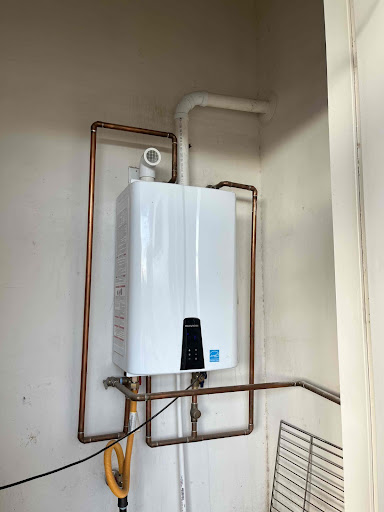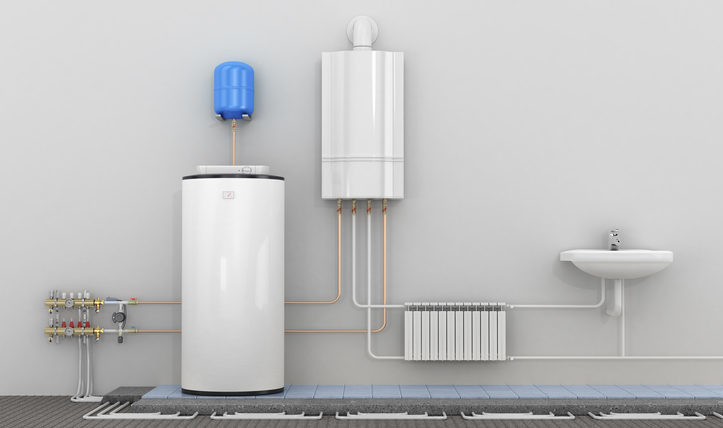Why Instant Water Heaters Grant Valuable Benefits
Why Instant Water Heaters Grant Valuable Benefits
Blog Article
Are you trying to locate details around Pros and Cons of Tankless Water Heater?

In a globe where comfort and efficiency preponderate, it's not a surprise that property owners are frequently on the lookout for smarter methods to handle their home's power consumption and comfort. One advancement that has progressively gained popularity is the tankless water heater. But just what makes these systems attract attention from the standard tank-based versions a lot of us grew up with? Allow's dive in and check out the advantages of tankless hot water heater, assisting you choose if it's time to make the switch in your home.
Intro
Photo this: you step into the shower after a long day, anticipating a comforting waterfall of warm water, just to be greeted by icy droplets due to the fact that the last individual used everything up. Sound familiar? Conventional water heaters save a fixed quantity of hot water, meaning you go to the grace of that storage tank's supply. Tankless systems, on the other hand, heat water as needed. No more running out mid-shower, no more fumbling with routines just to make certain hot water is offered.
Comprehending Tankless Water Heaters
What Are Tankless Water Heaters?
Tankless water heaters, in some cases known as on-demand or instant water heaters, supply hot water just as it's required. As opposed to keeping gallons of pre-heated water, these units kick into action the moment you activate the faucet. Water travels through a warmth exchanger, warming up in real-time, implying you get an undisturbed flow of hot water without the need for a large tank sitting lazily by.
Exactly how Do They Vary from Conventional Equipments?
Conventional heating systems hold a storage tank of hot water, utilizing energy to maintain that storage tank at a regular temperature level. Tankless devices get rid of the standing supply, cutting down on wasted energy and the bulky footprint of a huge cylinder. Basically, you're upgrading from a "accumulation" attitude to a "made-to-order" method.
Usual Types of Tankless Systems
Tankless water heaters generally are available in 2 varieties: gas and electrical. Gas versions have a tendency to supply higher flow rates, suitable for bigger homes, while electric designs usually offer smaller sized homes and are typically simpler to install. In addition, some systems are designed for point-of-use (serving one fixture) while others can handle the whole home's hot water needs.
Key Benefits of Tankless Water Heaters
1. Unlimited Warm Water Supply
Ever had to schedule showers so everybody gets their reasonable share of warm water? With tankless, that ends up being a distant memory. As long as the heating unit's circulation ability isn't surpassed, you can take back-to-back showers without developing into a popsicle.
2. Energy Effectiveness and Price Cost Savings
No more warming a giant container's worth of water and keeping it cozy throughout the day. Tankless heaters lower standby energy losses, which can lower energy costs. While the initial cost might be higher, the long-lasting financial savings typically justify the investment.
3. Space-Saving Layout
If your home is short on storage, removing the large tank frees up useful space. Tankless units are small and can typically be installed on wall surfaces, concealed in edges, or set up in tight energy storage rooms without monopolizing the entire space.
4. Longer Lifespan
A well-maintained tankless hot water heater can outlast its tank-based relative. Traditional storage tanks could last 10-15 years, while tankless models can keep downing along for two decades or even more, making them a strong investment over time.
5. Improved Water Top Quality
Keeping water in a container can often bring about debris build-up or a slightly "off" taste. With tankless systems, fresh water is heated up instantly, lowering the chances of sediment accumulation and possibly using cleaner-tasting water.
Considerations Before Switching
Though the advantages are engaging, it's important to take into consideration a couple of elements prior to completely devoting.
First Investment Prices
Tankless heating systems generally feature a greater ahead of time price. In between the unit itself and prospective installment modifications, the initial price could give you sticker label shock. But remember to view it as a lasting investment.
Setup Needs
Relying on your home's infrastructure, you might require added electric ability or gas line upgrades. Guarantee you recognize the setup requirements and consult with a specialist to avoid shocks.
Reviewing Your Home's Water Usage Patterns
If your house all at once uses several components with high hot water demand, see to it the system's circulation rate meets your requirements. Recognizing your usage patterns aids you select the best dimension and kind of tankless heating unit.
Maintenance and Care Tips
Tankless systems are fairly low upkeep, however they aren't set-it-and-forget-it home appliances.
Routine Cleansing and Descaling
Difficult water minerals can build up in the warmth exchanger, influencing effectiveness. Routine descaling (typically recommended every year) keeps the system going for peak performance.
Yearly Professional Assessments
A yearly checkup from a professional makes sure small problems are captured early. They'll examine the system's efficiency, try to find leakages, and help preserve optimal performance.
Making Sure Proper Air Flow
For gas designs, proper air flow is necessary to securely eliminate exhaust gases. See to it airing vent systems are tidy and properly mounted to avoid any kind of potential safety threats.
Contrasting Different Brands and Versions
Not all tankless hot water heater are produced equal.
Investigating Trustworthy Makers
Search for respectable brands with a history of generating high quality units. A reliable maker typically provides much better consumer assistance and longer guarantees.
Reading Testimonials and Customer Feedback
User evaluations and feedback from neighbors or pals who have actually gone tankless can offer important understandings. In some cases, real-life experiences can be a lot more informing than marketing brochures.
Installation: DIY or Expert?
While some house owners cherish taking on tasks themselves, tankless setup may not be the very best time to break out the toolbox.
Advantages and disadvantages of DIY Setup
A DIY install could save cash, however it features threats. Inaccurate installation can lead to inadequacy or safety concerns. If you're handy and have experience, it might be possible-- yet proceed with caution.
When to Call a Specialist Plumbing Technician
For a lot of, calling a professional ensures whatever's done correctly. An expert plumbing professional understands local codes, sizing demands, and venting specifications, reducing the danger of mishaps.
Taking full advantage of Performance
You have actually invested in a tankless system-- currently maximize its performance.
Optimal Temperature Settings
Most people establish their devices between 120-140 F. Changing the temperature can enhance convenience and financial savings. Experiment to discover a wonderful place that doesn't waste energy.
Pairing with Low-Flow Fixtures
Want to extend your system's capabilities? Consider setting up low-flow showerheads and faucets. They lower water use, allowing your tankless system to deliver a consistent stream of warm water without stressing.
Environmental Influence
Tankless hot water heater straighten with greener living goals.
Minimized Carbon Impact
By using less power and only heating water as required, tankless systems can lower your home's carbon impact, reducing your ecological impact.
Conserving Natural Resources
Much less energy consumption and much less lost warm water equate right into fewer natural deposits being made use of, an ecological win-win.
That Benefits A Lot Of from Tankless Heating systems?
The elegance of tankless heating systems is that they can suit a range of houses.
Huge Families vs. Solitary Passengers
Big households might enjoy the limitless hot water supply, while solitary owners appreciate the power cost savings from not heating a whole container for simply one person's early morning shower.
Home Owners with Minimal Area
If your home is short on square footage, shedding the bulky tank maximizes room for other essentials-- or perhaps simply more elbow room.
Eco-Conscious Customers
Going tankless aligns with environmentally friendly values, ensuring you're not throwing away energy or sources.
Future Trends in Tankless Water Heaters
The globe of home devices is ever-evolving, and tankless hot water heater are no exemption.
Smart Home Assimilation
Picture changing your water heater's temperature level via an application or receiving maintenance alerts on your phone. As clever home technology advances, we'll see more connectivity and benefit.
Innovations in Technology
R&D is continuously enhancing warmth exchangers, making devices more reliable and durable. Future versions may be also quieter, much more small, and far better suited for differing climates.
Conclusion
Selecting a tankless water heater is greater than simply updating your home's warm water system; it's purchasing long-lasting comfort, energy efficiency, and a greener lifestyle. By considering your household's water use, being mindful of installment requirements, and committing to routine upkeep, you can appreciate a stable stream of warm water without the baggage of a large storage tank. As innovation advances, you can anticipate even smarter, more efficient tankless remedies that not only make your life much easier however likewise profit the planet.
Why You Should Consider a Tankless Water Heater for Your Home
Energy Efficiency and Cost Savings
Tankless water heaters, also known as on-demand water heaters, heat water only when needed. This means they don't waste energy keeping a tank of water hot constantly. This efficiency translates into substantial cost savings on your monthly energy bills.
Endless Hot Water Supply
One of the significant advantages of tankless water heaters is their ability to provide a continuous supply of hot water. Traditional tank water heaters have a limited capacity and can run out of hot water, especially during peak usage times. In contrast, tankless water heaters can provide an endless stream of hot water, making them ideal for larger families or homes with high water usage.
Space-Saving Design
Tankless water heaters are compact and take up significantly less space compared to traditional tank heaters. They can be installed on walls, under cabinets, or even outside, freeing up valuable space in your home. This makes tankless water heaters a great option for smaller homes or properties with limited space for a traditional water heater.
Longer Lifespan and Lower Maintenance
Tankless water heaters typically have a longer lifespan compared to traditional tank heaters. They can last up to 20 years or more with proper maintenance. Additionally, tankless systems are designed with replaceable parts, which can extend their lifespan further and reduce long-term maintenance costs.
Environmentally Friendly
Reducing energy consumption not only saves you money but also benefits the environment. Tankless water heaters contribute to a smaller carbon footprint by using less energy to heat water. Their energy efficiency and ability to minimize standby heat loss make them an eco-friendly choice for environmentally conscious homeowners.
Customized Temperature Control
Tankless water heaters offer precise temperature control, allowing you to set the desired temperature to meet your specific needs. This level of customization ensures you always have water at the perfect temperature for your comfort and usage requirements.
https://beantownservices.com/blog/consider-tankless-water-heater-for-your-home

As a passionate reader on Pros and Cons of Tankless Water Heater, I figured sharing that segment was really useful. Sharing is nice. Helping others is fun. I value reading our article about 5 Benefits of Tankless Water Heaters.
Book Instantly Report this page